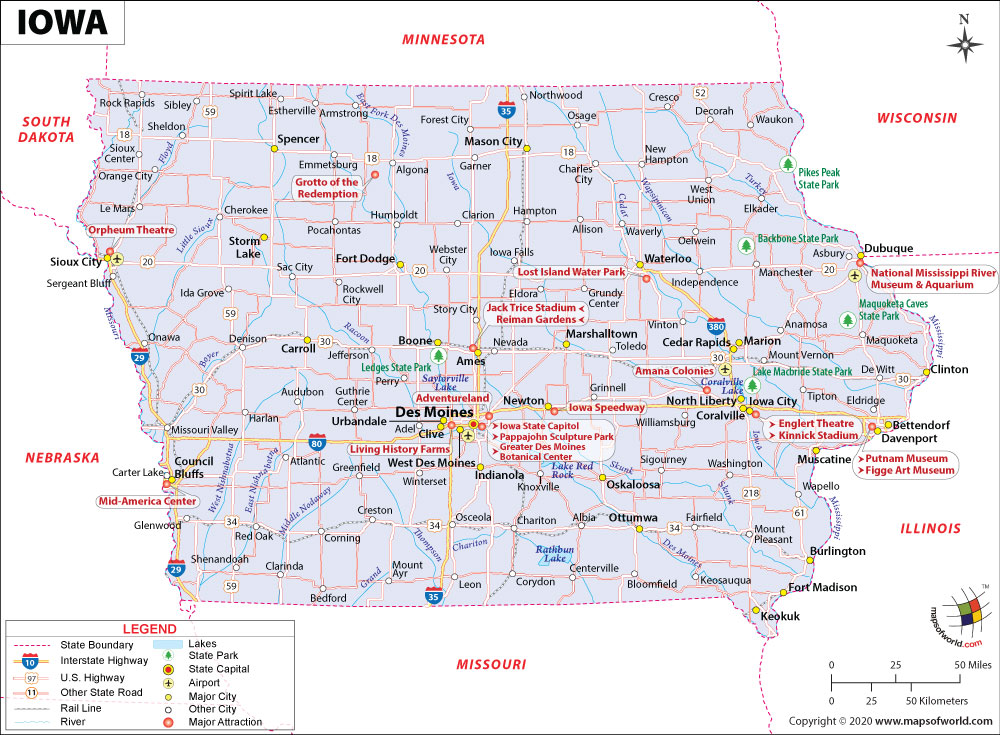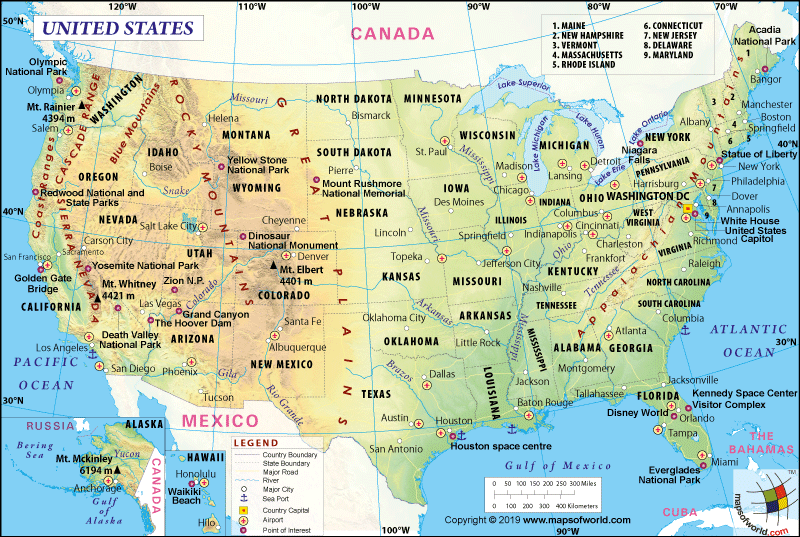What are the Key Facts of Iowa?

|
State |
Iowa |
|
State Capital |
Des Moines |
|
Largest City |
Des Moines |
|
Coordinates |
42°N 93°W |
|
Nickname(s) |
“Hawkeye State” |
|
Postal Abbreviation |
IA |
|
Area |
58,272.81 sq. mi (145,746 sq. km) |
|
Highest Point |
Hawkeye Point, 1,671 ft (509 m) |
|
Number of Counties |
99 |
|
Neighboring States |
Minnesota, Wisconsin, Illinois, Missouri, Nebraska, South Dakota |
|
Population |
3,156,145 (2018) |
|
Date of Entering the Union |
December 28, 1846 |
|
State Anthem |
“The Song of Iowa” |
|
Governor |
Kim Reynolds (Republican) |
|
Lieutenant Governor |
Adam Gregg (Republican) |
|
U.S. Senators |
Chuck Grassley (Republican), Joni Ernst (Republican) |
|
U.S. House Delegation |
Abby Finkenauer (Democratic Party), Dave Loebsack (Democratic Party), Cindy Axne (Democratic Party), Steve King (Republican) |
|
GDP (Millions of Dollars) |
189702 |
|
Demonym |
Iowan |
|
Time Zones |
UTC-06:00 (Central), Summer (DST) UTC-05:00 (CDT) |
Where is Iowa?
Iowa (the 29th state that was admitted to the union on December 28, 1846) lies in the Midwestern USA. This landlocked state shares its borders with Minnesota to the north, Wisconsin to the northeast, South Dakota to the northwest, Nebraska to the west, Missouri to the south, and Illinois to the east and southeast.
What is the Geography of Iowa?
Iowa has a total area of 56,273 sq mi (145,746 sq km), out of which 55,857 sq mi (144,669 sq km) is land area and 416 sq mi (1,077 sq km) is water area. The water area occupies just 0.7% of the total area. In terms of the total area, it is the 26th largest state in the US. This state is 310 mi (499 km) long and 200 mi (322 km) wide.
Iowa’s mean elevation is 1,100 ft (335 m) above sea level. While Hawkeye Point (on Sterler Farm in Osceola County, north of Sibley) is the highest elevation point of the state at 1,670 ft (509 m) above sea level, the Mississippi River at 480 ft (146 m) above sea level is the lowest elevation point.
Some of the major mountains in Iowa are Hawkeye Point, Ocheyedan Mound, Pikes Point, Pilot Knob, Wheelers Beach, Lime Kiln Point, Des Moines Beach, Maywood Beach, Pillsbury Point, and Gilleys Beach.
Some of the longest rivers in the state are Missouri River, Mississippi River, Des Moines River, Big Sioux River, Cedar River, Iowa River, Wapsipinicon River, Little Sioux River, Grand River and Chariton River.
If you are a tourist, don’t miss the natural beauty of some of the picturesque rivers in Iowa. Some of the major rivers are Upper Iowa River, Raccoon River, Des Moines River, Wapsipinicon River, Iowa River, Maquoketa River, Cedar River, Little Sioux River, Skunk River and Boone River. Lake Red Rock, Rathbun Lake, Saylorville Lake, Big Spirit Lake, and West Okoboji Lake are the major lakes in this state.
Iowa’s landforms can be divided into three main regions: the Young Drift Plains, the Driftless Area, and the Dissected Till Plains. The land is highly fertile between the two main rivers in the state: the Mississippi River (on the east) and the Missouri River (on the west). The corn producers mainly produce their corn in this fertile land, making Iowa the largest corn producer in the US.
The Young Drift Plains mainly covers the northern and central parts of Iowa. It mostly consists of flat and fertile lands. This landform consists of rocks, gravel, sand, and clay, which are collectively called drift. These are the world’s most fertile topsoil. The glaciers during the ice age have left behind the drift on this land. Swamps, lakes, and glaciers are found in the hollows in the land that are not filled up by the drift.
The Driftless Area, the second most important landform in Iowa, is found in the northern part of the state. It runs parallel to the Mississippi River. Rugged hills and cliffs are the characteristic features of Iowa, and this region is not as flattened as the Young Drift Plains.
The deposited drift in this region is either washed away or blown away. That’s why the soil is thin and hardly suits farming. The hills here have pine-forested hills, which look beautiful. They have become a favorite destination for outdoor recreation. The people in this state call this place “The Switzerland of America”.
The Dissected Till Plains are located along southern Iowa and extend to the northwest along the Missouri River and Big Sioux River. Glacial drift called till, left behind by the glaciers of the Ice age, are found in this region. Low, rolling hills and ridges are formed in the Dissected Till Plains as the rivers and streams have dissected the terrain for over thousands of years. Over 100-300 ft (30.5-91.4 m) high Bluffs (formed by wind-blown soil) rise above the Missouri River.
What is the Climate of Iowa?
The climate in Iowa has four seasons, thanks to its location deep in the interior of the continent.
The winters are cold. During January, the average temperature in the northwest hovers around 14 °F (−10 °C) and in the southeast region around 20 °F (−6 °C). Iowa gets light snowfall in comparison to other states of the US. Snow cover hardly remains throughout winter.
During late-autumn and early-spring, heavy snowfall takes place in the state. The summer season remains warm and humid. The average temperature during July hovers around mid-80 °F (around 30 °C). The temperature reaches 100 °F (38 °C) only rarely. The monthly average temperature ranges within a high of 86.2 °F (30.1 °C) to a low of 6.3 °F (-14.3 °C).
Rainfall is seasonal, and most of them take place during summer. While the average annual rainfall in northwest Iowa is less than 26 in (660 mm), it is more than 38 in (965 mm) in southeast Iowa.
What is the Economy of Iowa?
This state has a diversified and robust economy with a strong foundation of agriculture. It is one of the top-5 best-run states in the USA. The state has earned the name of “America’s heartland” due to its abundant supply of leading quality agricultural and manufactured goods.
The manufacturing sector is mainly dependent upon heavy machinery, chemicals, electronics, and food processing. The main crops produced in the state are corn and soybean. Around 97,000 Iowa farms produce approximately 18% of the total corn and 18% of the total soybean produced in the US. Reports say the animal farms in Iowa produce around 18% of the pork, 4% of the grain-fed beef, and 8% of the eggs produced in the US.
The total GDP of Iowa was US$189701.6 in 2018, an increase from US$136,553.6 in 2008. In the last decade (during 2008-2018), the real median household income increased from US$58,623 to US$68,718. The Per Capita, Personal Income in this state, increased from US$38,537 in 2008 to US$50,124 in 2018.
The total value of exports and imports of the state in 2018 were $14,377,073,207 and $10,734,707,907 respectively, leading to a trade balance of $3,642,365,300.
The main export items of Iowa are Industrial Machinery, Industrial Machinery, Motor Vehicles and Parts, Cereals, Meat, Animal Feeds, Chemical Products, Electrical Machinery, Oil Seeds, Aircraft, Organic Chemicals, etc.
The major import items of the state are Industrial Machinery, Motor Vehicles and Parts, Electrical Machinery, Organic Chemicals, Furniture, Aluminum, Iron and Steel Articles, Plastics, Oil and Mineral Fuels, etc.
The rate of unemployment increased rapidly from 3.7% in March 2008 to 6.6% in June 2009. However, it has now come down to 2.6% in November 2019. The rate of poverty was 10.7% in Iowa in 2018. Out of the total population of 3,044,685, the number of persons living in poverty in 2018 was 326,636.
What is the Transportation System of Iowa?
Iowa has an intricate network of roadways, including US highways, interstate highways, and state highways. The main interstate highways passing through Iowa are I-29, I-35, I-74, I-80, I-80N, I-129, I-235, I-280, I-380, I-480, I-680, and I-880. The US highways in this state are US 6, US 18, US 20, US 30, US 34, US 52, US 169, US 218, US 275, etc. The Iowa Department of Transportation owns and maintains the state highways. Some of the significant state highways are Iowa 1-478 and Iowa 903-999.
The major airports in this state are Des Moines International Airport (in Des Moines), The Eastern Iowa Airport (in Cedar Rapids), Dubuque Regional Airport (in Dubuque), Sioux Gateway Airport (in Sioux City) and Waterloo Regional Airport (in Waterloo).
Why is Iowa called the “The Hawkeye State”?
“The Hawkeye State” is the official state nickname of Iowa. This nickname was officially approved by the “territorial officials” in 1838, 12-years after James Fenimore Cooper’s famous novel “The Last of the Mohicans” was published (in 1826). They said the popular nickname got inspiration from the scout, Hawkeye, in the novel. “The Hawkeye State” nickname was a tribute to the leader of the Native American Sauk tribe’s chief Black Hawk, who relocated to Iowa after unsuccessfully fighting with the settlers.
Judge David Rorer of Burlington and James G. Edwards of Fort Madison are believed to have popularized the nickname. James G. Edwards, the newspaper publisher of “The Iowa Patriot”, changed the name of his newspaper to “The Hawk-Eye and Iowa Patriot” in tribute to his friend Chief Black Hawk.
While Judge David Rorer proposed the name “The Hawkeye State” for this state after finding its mention in the novel “The Last of the Mohicans”, James G. Edwards is believed to have proposed the nickname “Hawk-eyes” in 1838.
The other nicknames of the state are “The Corn State” and “Land of the Rolling Prairie”.
What are the Popular Tourist Attractions in Iowa?
National Mississippi River Museum and Aquarium, National Czech and Slovak Museum and Library, State Capitol, Maquoketa Caves State Park, Amana Colonies, RAGBRAI bike race from east-to-west Iowa to showcase the midwestern culture, The Bridges of Madison County, Des Moines Art Center, Herbert Hoover National Historic Site, American Gothic House, Field of Dreams Movie Site, Grotto of the Redemption
Facts About Iowa
1) The nickname of Iowa is “The Hawkeye State”.
2) The capital of Iowa is Des Moines and it is the biggest city of the state.
3) Iowa falls under the Central Time Zone.
4) The state of IA was admitted to the Union on December 28, 1846.
5) The state covers a total area of 56,272 square miles and it is the 26th biggest state in the United States.
6) Situated at an elevation of 1,670 feet, the Hawkeye Point is the tallest point in the state.
7) Iowa shares its boundaries with Wisconsin, Minnesota, Missouri, Illinois, Nebraska, and South Dakota.
8) The official bird of the state is the Eastern Goldfinch.
9) The official tree is the Oak.
10) Le Mars is dubbed as the “Ice Cream Capital of the World”.
11) The state is the only one, which has two vowels at the beginning of its name.
12) There are eight cities in the state, which start with the word Saint.
13) The official flower is the Wild Rose.
14) The official anthem is “Song of Iowa”.
15) Some of the famous residents of the state are John Wayne, Herbert Hoover, Harriet Nelson, and Donna Reed.
16) The official motto is “Our liberties we prize and our rights we will maintain”.
17) The state is famous for its manufacturing industry.
18) Iowa is affluent in natural resources like gypsum, gravel, coal, sand, and lead.
19) The tallest point of the state is the Hawkeye Point. The elevation is 1,670 feet.
20) The citizens of the state are called as Iowans.
Related Links:


